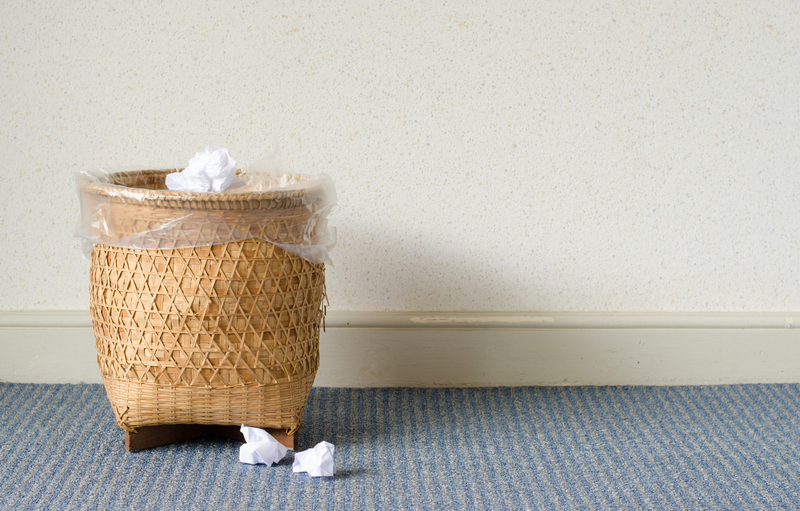What Are the Most Cost-Effective Ways to Get Rid of Bulky Waste Items?
Dealing with bulky waste items--such as old furniture, appliances, mattresses, and other large household trash--can be both a logistical and financial headache. Whether you're spring cleaning, renovating your home, or clearing out after a move, responsibly disposing of these items is crucial for saving money and protecting the environment. But what are the most cost-effective methods for removing large waste? In this comprehensive guide, we'll explore various options, practical tips, and common pitfalls to help you get rid of bulky waste items without breaking the bank.

Understanding Bulky Waste: What Qualifies as Large Garbage Items?
First, it's vital to define what constitutes bulky waste items. These typically refer to:
- Old sofas, couches, recliners, or chairs
- Mattresses and bed frames
- Large appliances--like refrigerators, washing machines, and stoves
- Wardrobes, tables, and desks
- Garden waste such as branches or fence panels
- Carpets and floor coverings
- Large toys or sports equipment
These are items that are too large or heavy for regular curbside trash pickup. Because they're cumbersome, disposing of them can involve special considerations and extra costs. Luckily, there are numerous budget-friendly solutions to tackle the issue.
Why Proper Disposal of Bulk Waste Is Important
Improper disposal of large waste items can lead to environmental harm, fines, or even health hazards. Illegal dumping or burning is neither safe nor cost-effective. Municipalities often charge steep fees for unauthorized disposal, so choosing a legitimate and economical option is essential for your wallet--and the planet.
Top Cost-Effective Solutions for Getting Rid of Large Waste Items
1. Donate Usable Items
One of the best ways to dispose of large unwanted household items is through donation. Many charities will accept furniture, appliances, or other bulky items in good condition. Some even offer free pickup, saving you money and helping others in need.
- Charities & Local Organizations - Organizations such as the Salvation Army, Habitat for Humanity, and Goodwill accept a wide range of items. Smaller local nonprofits or thrift shops may also benefit from your donations.
- Give to Community Networks - Neighborhood apps (like Nextdoor), online platforms (like Freecycle or Facebook Marketplace), and community bulletin boards are great for offering free or cheap items to people nearby. Many will arrange their own pickup, which means zero disposal cost for you.
Tip: Clean the item and take clear photos if posting online. Specify dimensions and potential uses to attract interested parties quickly.
2. Sell Your Bulk Waste Items
Did you know you can make money while disposing of your large items? Even if your items are old, there may be secondhand value--especially for furniture and working appliances.
- Online Marketplaces - Platforms like Craigslist, eBay, OfferUp, or Facebook Marketplace let you list and sell items locally. Setting the price low or as "best offer" can ensure a quicker sale.
- Garage Sales - If you have multiple bulky items, consider holding a yard sale or garage sale. This is an old-fashioned yet effective way to attract local buyers.
Cost-Effectiveness: Selling covers any disposal costs and can even generate profit. Just be clear about pickup logistics to avoid having to transport the items yourself.
3. Arrange for Curbside Bulk Waste Pickup
Most municipalities offer scheduled curbside bulky waste pickup as part of their solid waste management services. Some cities provide free annual or biannual collection days, which is one of the cheapest methods available.
- Check Local Regulations - Contact your local waste authority for information on what qualifies as "bulky waste" and the schedule for pickups.
- Follow Preparation Guidelines - Items may need to be separated, bagged, or tagged. Following guidelines prevents delays or fines.
Opting for municipal curbside collection is an incredibly affordable way to get rid of large waste items. However, there may be restrictions on the quantity or type of material accepted, so always check with the local council.
4. Use a Local Recycling Center
Many large items--such as appliances, metal furniture, or electronics--can be recycled. Municipal recycling centers or transfer stations often accept these items at a low cost or even for free.
- Identify Acceptable Materials - Contact your local recycling center or check their website for a list of items accepted.
- Drop-Off Requirements - Some centers require you to schedule a drop-off time or separate materials (e.g., scrap metal from upholstery).
*Cost-Saving Note:* Electronic waste (e-waste) and metal appliances are often recyclable at no charge, keeping them out of landfills while saving you money.
5. Hire a Junk Removal Service (with Smart Selection)
While hiring a junk removal company isn't the cheapest option, it can be cost-effective if you have numerous items, little time, or no way to transport waste yourself. Here's how to make it work on a budget:
- Compare Quotes - Get estimates from multiple providers. Some companies offer discounts for curbside or grouped pickups.
- Choose Off-Peak Times - Prices may be lower on weekdays or during offseason periods.
- Share a Pickup - If neighbors also have waste to remove, split the service and share the cost.
Look for local, independent junk haulers as well as national franchises for the best deals. Double-check they are licensed and insured for responsible disposal.
6. Rent a Dumpster (Share With Neighbors)
A dumpster rental is a great solution if you're clearing out a whole house or have a mix of large and small debris. While the upfront cost is higher, sharing with others can make it a cost-effective waste removal method.
- Choose the Right Size - Select a dumpster big enough for your needs but not too large, as bigger containers are more expensive.
- Neighborhood Cleanups - Organize a communal cleanup and split the rental fee.
- Watch for Hidden Fees - Check policies on overfilling, weight limits, and prohibited items.
This bulk waste disposal method is especially suitable for renovations or major decluttering projects.
7. Take Advantage of Special Collection Events
Cities and towns occasionally hold special bulk waste collection days for residents, where you can dispose of everything from sofas to tires. These events are either free or low cost, making them a smart choice for budget-conscious households.
- Check Community Calendars for upcoming dates. Register ahead if required.
- Abide by Rules - Items usually need to be placed curbside by a certain time and may have limits per household.
These events are ideal for one-off cleanouts and are much cheaper than private disposal options.
8. Repurpose or Upcycle Bulky Items
Turning old, large items into something useful saves disposal costs and reduces waste. For example, an old dresser can become workshop storage, an unused mattress could be reused as camping padding, or broken furniture could be converted into garden planters.
- DIY Projects - Check online for upcycling tutorials tailored to your bulky object.
- Creative Exchange - Offer items to local artists, schools, or community groups.
Repurposing is free, green, and creative!
Smart Tips for Reducing Bulk Waste Removal Costs
- Schedule disposal in advance to make use of free curbside pickups or municipal events.
- Disassemble items where possible. Breaking items down can reduce size-related fees and make items easier to transport.
- Combine tasks--get rid of all bulk items at once rather than making multiple trips or appointments.
- Check for local grants or subsidies for appliance recycling, mattress disposal, or hazardous material handling.
- Avoid illegal dumping or burning to protect your community and avoid fines.
Common Pitfalls to Avoid When Removing Bulky Waste
Even the most budget-conscious efforts can go wrong if you're not careful. Here are some mistakes to steer clear of:
- Ignoring local disposal regulations--which can result in fines.
- Assuming all junk removal firms are equal--pricing can vary by hundreds of dollars.
- Overfilling dumpsters or bins--which may incur extra charges.
- Failing to separate recyclables--missing out on potential free disposal options.
- Leaving items outdoors without proper arrangements--which can lead to weather damage, fines, or theft.

Final Thoughts: The Best Way to Remove Large Waste on a Budget
Dealing with bulky waste disposal doesn't need to be expensive or complicated. With a little planning and resourcefulness, you can find the most cost-effective way to get rid of bulk waste items--whether through donation, resale, curbside services, recycling, or community collection days. Always prioritize solutions that are environmentally responsible and tailored to your specific needs.
Summary Checklist:
- Donate or sell usable items before considering disposal.
- Leverage free or subsidized municipal services whenever possible.
- Recycle items that qualify at local centers.
- Compare removal services if you need professional help.
- Share or repurpose what you can to avoid landfill costs.
By following these expert tips and exploring your local options, getting rid of bulky waste items doesn't have to be costly--and you can feel good knowing you're doing your part for the environment and your wallet.
Frequently Asked Questions (FAQ)
Q: What is considered a bulky waste item?
A: Bulky waste items include large household goods such as furniture, mattresses, appliances, carpets, and metal objects that can't fit in regular trash bins or bags.
Q: Can I leave bulky waste at my curb any time?
A: Not usually. Most cities require you to book ahead or only allow large waste to be left out on specified collection days to avoid fines or illegal dumping.
Q: Is it illegal to dump furniture in public spaces?
A: Yes, illegal dumping is prohibited and subject to significant fines. Always use official waste disposal methods.
Q: How do I find local disposal options for bulk waste?
A: Check your city or town's public works or sanitation department website for information on curbside pickup, recycling centers, or special collection events.
Q: Are there free ways to get rid of heavy or large items?
A: Absolutely. Donation, community events, and some recycling centers offer free removal or drop-off for qualifying items.
Explore your options, get creative, and save money the next time you need to get rid of bulky waste items!
